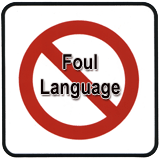President Bush has promised to veto the “hate crimes” bill (H.R. 1592) that was passed in Congress last week.
For the record, I personally am against crime.
All crime. I believe when someone commits an act of violence against another person or destroys another’s property that they are motivated by hate. Vandalism, muggings, beatings, rape, and murder clearly are not acts of love. All around the country these acts are against the law and carry penalties, including the death penalty sometimes for murder.
So why is it more wrong to hurt certain classes of people than others? Isn’t it just wrong to hurt people? Period?
Obviously, some groups of people are more favored than others in the eyes of certain members of Congress. For example, some Republicans had tried to include additional classes of citizens—children, members of the military, the elderly, the homeless—but their attempts were shot down. So sexual identity gets a pass, but children and the elderly don’t. I guess all people are equal, but some are more equal than others. (On the other hand, maybe women's rights groups can push for all rapes to be prosecuted doubly as both rape and hate crime since rape could be argued to demonstrate misogyny. Of course, male on male rape wouldn't fall under that category....)
Of concern is the fact that liberals refused to include any amendment that would protect religious expression. Laws such as this one have been used to stop free discourse which apparently some people believe to be criminal. We can foresee the results as there are similar laws to H.R. 1592 in England, Sweden, and Canada which have led to prosecution of Christians for hate crimes for stating a Biblical view of homosexuality, for example. Yes, it can happen here. So much for free speech and the First Amendment to the Constitution. Whatever happened to “I may disagree with what you say, but I’ll defend to the death your right to say it”?
In closing, here is the text of the statement from the White House on H.R. 1592:
"The Administration favors strong criminal penalties for violent crime, including crime based on personal characteristics, such as race, color, religion, or national origin. However, the Administration believes that H.R. 1592 is unnecessary and constitutionally questionable. If H.R. 1592 were presented to the President, his senior advisers would recommend that he veto the bill."
"State and local criminal laws already provide criminal penalties for the violence addressed by the new Federal crime defined in section 7 of H.R. 1592, and many of these laws carry stricter penalties (including mandatory minimums and the death penalty) than the proposed language in H.R. 1592. State and local law enforcement agencies and courts have the capability to enforce those penalties and are doing so effectively. There has been no persuasive demonstration of any need to federalize such a potentially large range of violent crime enforcement, and doing so is inconsistent with the proper allocation of criminal enforcement responsibilities between the different levels of government. In addition, almost every State in the country can actively prosecute hate crimes under the State's own hate crimes law."
"H.R. 1592 prohibits willfully causing or attempting to cause bodily injury to any person based upon the victim's race, color, religion, or national origin, gender, sexual orientation, gender identity, or disability. The Administration notes that the bill would leave other classes (such as the elderly, members of the military, police officers, and victims of prior crimes) without similar special status. The Administration believes that all violent crimes are unacceptable, regardless of the victims, and should be punished firmly."
"Moreover, the bill's proposed section 249(a)(1) of title 18 of the U.S. Code raises constitutional concerns. Federalization of criminal law concerning the violence prohibited by the bill would be constitutional only if done in the implementation of a power granted to the Federal government, such as the power to protect Federal personnel, to regulate interstate commerce, or to enforce equal protection of the laws. Section 249(a)(1) is not by its terms limited to the exercise of such a power, and it is not at all clear that sufficient factual or legal grounds exist to uphold this provision of H.R. 1592."
-source lifesite
Labels: equality, H.R. 1592, hate crime, religious expression








